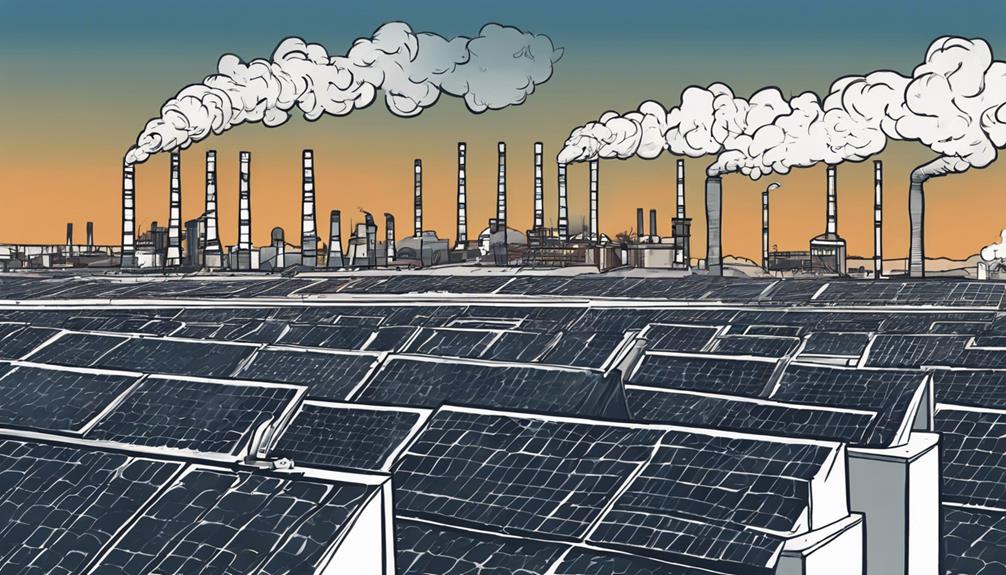By choosing solar energy over fossil fuels, you benefit the environment by reducing greenhouse gas emissions and air pollution. This leads to cleaner air, healthier communities, and a more sustainable future. In addition, solar energy is cost-effective, offers job opportunities, and contributes to technological advancements. Make the switch to solar power for a brighter tomorrow.
Key Takeaways
- Solar energy reduces harmful emissions, unlike fossil fuels.
- Transitioning to solar energy combats air pollution and its health risks.
- Solar power is cost-effective and competitive with fossil fuels.
- Solar energy promotes job creation in the clean energy sector.
- Using solar energy contributes to a healthier environment and population.
Environmental Benefits of Solar Energy
Selecting solar energy over fossil fuels leads to a significant decrease in greenhouse gas emissions, contributing to a cleaner environment. Solar energy offers immense environmental benefits by generating electricity without the harmful byproducts linked to burning fossil fuels. Solar panels capture the power of sunlight to produce clean energy, eliminating air and water pollution that plagues traditional energy sources. By choosing solar power, you directly combat climate change, promoting a healthier planet for current and future generations.
The environmental advantages of solar energy extend beyond emission reductions. Solar power is a sustainable and renewable energy source that helps conserve natural resources. Unlike finite fossil fuels, solar energy relies on an abundant and constant source of energy – the sun. This sustainability ensures that future energy needs can be met without depleting precious resources or harming the environment. Embracing solar energy is an essential step towards creating a cleaner, greener planet with minimal environmental impact.
Cost-Effectiveness of Solar Power

Solar power has emerged as a cost-effective energy alternative to fossil fuels, offering competitive pricing and financial benefits. Solar energy bids have now leveled the playing field with fossil fuel prices, making it a cost-effective option that is even cheaper than coal without subsidies. Government subsidies play a vital role in influencing the growth potential of energy sources, and solar energy stands out as the most cost-effective renewable energy globally. In the U.S., a significant contributor to fossil fuel subsidies, solar projects can provide energy at a significantly lower cost compared to traditional fossil fuels, further highlighting its cost-effectiveness.
| Solar Power | Fossil Fuels |
|---|---|
| Cheaper than coal | Higher cost without subsidies |
| Competitive pricing | Government subsidies influence growth |
| Cost-effective renewable energy | U.S. spends $452 billion on subsidies annually |
Technological Advancements in Solar Energy

You've probably noticed how solar technology keeps evolving rapidly, with silicon cells becoming more efficient in converting sunlight into energy.
The industry's adherence to Moore's Law has sparked exponential innovation, paving the way for future solar technologies.
As costs decrease and accessibility increases, the progress in solar energy is undeniably remarkable.
Solar Efficiency Innovations
With ongoing advancements in solar technology, the efficiency of solar energy systems continues to increase at a rapid pace.
Silicon cells within solar panels play a pivotal role in converting sunlight into electricity efficiently.
This innovation in solar technology, particularly in solar PV systems, has led to significant improvements in harnessing solar energy.
Solar technology improvements are following a trend similar to Moore's Law, resulting in exponential advancements in efficiency.
The decreasing costs of solar technology have made solar power cost-competitive with fossil fuels, driving its widespread adoption.
Solar PV systems aren't only easily installed but also effectively harness sunlight for energy production, making them a viable renewable energy option.
Solar energy's sustainability and continuous technological enhancements position it as a green power solution that's becoming increasingly efficient and accessible.
Future Solar Technologies
Advancements in solar technology are rapidly shaping the future of renewable energy solutions. Innovations in solar technology, such as the development of six-junction solar cells that can convert 47% of sunlight into electricity, are pushing the boundaries of efficiency.
The application of Moore's Law to solar power is fostering exponential innovation, leading to improved efficiency levels. Silicon cells continue to play a pivotal role in converting sunlight into energy, making solar power a cost-effective option for many.
Noteworthily, the costs associated with solar technology have markedly decreased over time, enhancing its accessibility to a wider consumer base. Ongoing research and development in solar hardware are focused on further lowering costs and improving efficiency, ensuring that solar energy remains a competitive and sustainable alternative to traditional fossil fuels.
As these advancements continue to unfold, the future of solar technology looks promising in providing efficient and cost-effective renewable energy solutions.
Solar Energy Progress
Technological advancements in solar energy have revolutionized the efficiency and cost-effectiveness of capturing sunlight for generating electricity.
Silicon solar cells, dating back to 1954, remain prevalent in solar technology advancements, while newer technologies have greatly enhanced sunlight capture efficiency. Remarkably, six-junction solar cells have achieved an impressive 47% conversion rate of sunlight into electricity, marking a substantial leap in energy production.
Additionally, the installation costs of solar panels have seen a notable decline due to these advancements, making solar energy a more accessible option for many. As solar technology continues to progress, it not only proves to be a sustainable alternative to fossil fuels but also a cost-effective and efficient system for generating electricity.
Embracing these advancements in solar energy is vital for a greener and more sustainable future.
Sustainability of Solar Vs. Fossil Fuels

Solar energy stands out as a sustainable choice when compared to fossil fuels due to its reliance on sunlight, a nearly limitless and renewable resource. The benefits of solar energy include minimal environmental impact compared to fossil fuels, which degrade the environment and pollute water supplies.
Solar technology is constantly improving, with costs decreasing over time, making it a cost-effective and sustainable energy option. Solar energy is a green, non-polluting, and replenishable resource, offering a cleaner and more sustainable energy solution. By switching to solar energy, greenhouse gas emissions can be reduced, helping to mitigate climate change and create a healthier environment for future generations.
In contrast, fossil fuels contribute significantly to greenhouse gases, further highlighting the sustainability of solar energy as a cleaner and more environmentally friendly alternative.
Market Accessibility for Clean Energy

To explore the accessibility of clean energy options, consider EnergySage's marketplace as a resource for affordable solar solutions. EnergySage, supported by the U.S. Department of Energy, offers a platform that connects users with unbiased energy advisors, making the shift to solar energy easier.
By entering a zip code, individuals can access typical solar installation costs, facilitating informed decisions on switching to a cleaner source of energy for their homes. This marketplace not only promotes whole-home electrification solutions but also aids in reducing carbon footprints and saving money through solar installations.
EnergySage's platform simplifies the process of adopting solar energy, making it more accessible and cost-effective for homeowners. By leveraging this resource, you can contribute to the global energy shift towards cleaner sources, while also exploring options for energy storage solutions that benefit both your wallet and the environment.
Health Impacts of Solar Vs. Fossil Fuels

Switching to solar energy from fossil fuels can greatly benefit your health. Solar power doesn't release harmful pollutants like fossil fuels, reducing the risk of respiratory illnesses and cardiovascular diseases.
Health Comparison: Solar Vs. Fossil
Shifting to solar energy offers a significant improvement in public health compared to relying on fossil fuels. Here are some key points highlighting the health benefits of solar energy over fossil fuels:
- Solar energy reduces harmful emissions, decreasing the risk of respiratory illnesses and heart diseases caused by air pollution from fossil fuels.
- Production of solar energy doesn't release pollutants like particulate matter, sulfur dioxide, and nitrogen oxides, which are common in fossil fuel combustion.
- Fossil fuel emissions contribute to smog, asthma, lung cancer, and other respiratory diseases, while solar energy helps alleviate these health issues.
- Opting for solar energy leads to cleaner air, healthier communities, and a reduced strain on healthcare systems due to fewer pollution-related illnesses.
Environmental Impacts Analysis
By comparing the health impacts of solar energy and fossil fuels, it becomes evident that solar energy notably contributes to a healthier environment and population. Air pollution from fossil fuels causes millions of deaths annually, primarily due to the emission of harmful pollutants like particulate matter and sulfur dioxide. In contrast, solar energy promotes cleaner air quality by producing electricity without releasing harmful emissions.
Switching to clean energy sources like solar can significantly reduce carbon emissions, mitigating the impacts of climate change and improving public health.
Transitioning to solar energy offers a sustainable solution to combat air pollution and its associated health risks. Unlike fossil fuels, solar power generation doesn't release pollutants that contribute to respiratory diseases and cardiovascular problems. Embracing renewable sources like solar energy is vital for fostering a healthier environment and reducing the burden of diseases caused by air pollution.
Make the switch to solar energy today to support a cleaner, healthier future for both the planet and its inhabitants.
Job Creation in Solar Industry

The solar industry stands out for its significant job creation potential, offering three times more employment opportunities compared to fossil fuels. Transitioning to solar energy could create 14 million new clean energy jobs, driving economic growth.
Currently, over 250,000 individuals are employed in the solar industry in the U.S., highlighting its job creation capacity. By shifting towards solar energy, additional jobs will be generated in energy-related sectors and innovative technologies.
Global Energy Transition to Renewables

Renewable energy sources such as wind and solar are rapidly gaining momentum as viable alternatives to traditional fossil fuels, driving a global shift towards a more sustainable energy future.
The change to renewables is further incentivized by government policies such as Investment Tax Credits and Tax Breaks, encouraging individuals and businesses to invest in clean energy solutions.
Wind power and solar energy pros are numerous, including diversifying economies, reducing air pollution, and creating new job opportunities.
According to IRENA, renewables have the potential to supply 90% of global electricity by 2050, showcasing the immense growth possibilities of clean energy.
Not only does this shift benefit the environment by reducing greenhouse gas emissions, but it also shields economies from the price volatility associated with fossil fuels.
Despite initial cost challenges, renewables like solar have become increasingly cost-competitive, with solar power costs plummeting by 85% from 2010 to 2020, making renewable energy a smart investment for a sustainable future.
Frequently Asked Questions
Why Is It Better to Use Solar Energy Than Fossil Fuels?
When you ask why it's better to use solar energy than fossil fuels, consider its minimal pollution, reduced greenhouse gas emissions, cost competitiveness, accessibility, sustainability, and technological advancements. Solar power offers a cleaner, affordable, and innovative alternative.
Why Should We Use Solar Energy?
Switching to solar energy shines light on sustainability, savings, and a cleaner future. Embrace the power of the sun, reduce emissions, and enjoy cost-effective, renewable energy that benefits both you and the environment.
What Are 5 Advantages and Disadvantages of Solar?
Solar energy offers reduced emissions, lower electricity bills, potential income from SRECs, enhanced property value, and minimal maintenance. However, high installation costs and space requirements are drawbacks compared to fossil fuels. Consider these factors when deciding.
Why Can't Solar Energy Replace Fossil Fuels?
You can't expect solar energy to fully replace fossil fuels right now due to infrastructure challenges, intermittency issues, and energy storage limitations. Current solar technology is advancing, but a complete shift will take time and innovation.
What Lessons Can We Learn from Germany’s Success in Using Solar Energy?
Germany’s approach to solar energy has been a huge success story, offering valuable lessons for other countries. They have demonstrated the importance of government support, investment in technology, and commitment to renewable energy. The German approach to solar has shown the potential for sustainable energy solutions on a large scale.
Conclusion
So, why should you use solar energy instead of fossil fuels?
Because it's the bee's knees!
Not only is it better for the environment, but it's also cheaper, constantly improving, more sustainable, widely available, healthier, and creating more jobs.
Plus, with the global shift towards renewables, you'll be ahead of the game by making the switch to solar power.
So go green, save some green, and join the solar revolution today!










